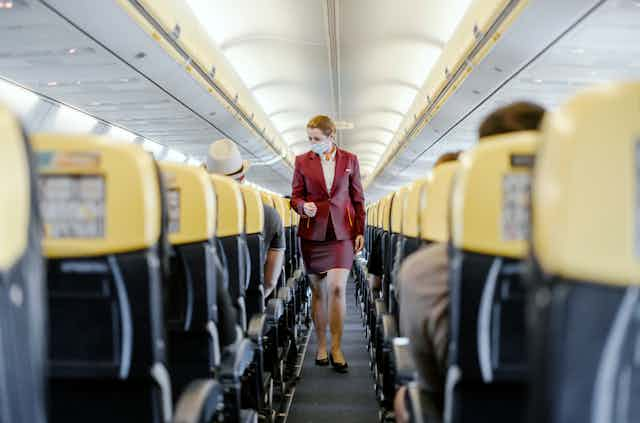In the early days of the pandemic, many countries closed their borders to stop the spread of COVID-19. International travel has continued to be limited with changing caveats, including “essential” travel only, restrictions on travellers from particular countries and vaccination “passports”.
While a necessary public health measure, these restrictions have been especially disruptive to migrant families. For these families, travel is a necessary part of fulfilling familial obligations and maintaining a sense of “familyhood” and belonging across borders.
These policies present a new layer of “everyday bordering” for transnational families. The term “everyday bordering” describes how policy and media narratives around migration affect migrants’ everyday lives and define who “belongs” in a nation state. In the UK, these borders amplify the state’s “hostile environment”, the Home Office’s immigration policy, aimed at making it as difficult as possible to stay in the UK without adequate documentation.
For migrants, their country of origin represents home and family. Visiting home is important to many people’s wellbeing and allows migrants to be part of family traditions and religious and cultural festivals. Travel may also be necessary to fulfil caring obligations for ageing, sick or young relatives.
Pandemic aside, the ability to visit home and family has always been constrained by a number of factors, including migration status and travel costs. The impact of these everyday borders on some migrants’ lives has been well-documented.
The introduction of COVID-19 travel restrictions has inhibited and added costly and complex border checks into the everyday lives of migrants. This is at a time when the need to maintain transnational family caring practices is particularly important.
Everyday borders
Our fieldwork for the study “Everyday Bordering in the UK” aims to understand how immigration legislation – including COVID-19 travel restrictions – has impacted social care practitioners and the migrant families they support.
Through interviews, diary entries and ethnographic observations, we explored how families from diverse migratory backgrounds experience everyday bordering. While transnational family practices were not our primary focus, our work has revealed the impact of COVID-19 travel restrictions on transnational family life. This was also supported by our researcher’s own travel experiences when visiting family in Italy.
Our research participants consistently discussed and wrote about their family members who do not live in the UK and expressed feeling responsible for their care. This demonstrates how important it is for family members to be able to travel in order to provide care.
Some expressed remorse at being unable to travel historically, due to restrictive visa conditions or prohibitive flight costs. Interviews and ethnographic observations from online English language classes also reveal the impact of COVID-19 travel restrictions on fulfilling care practices.
One couple from Poland –- whom we call Krystyna and Henryk –- now living in the UK, describe the disruption caused by such restrictions. In March 2020, Krystyna was visiting Poland to help her parents with her ageing grandparents, when travel was first inhibited. She was unable to return to her partner in the UK due to flight cancellations.
During this time, Henryk described being “depressed” and alone, saying:
My family isn’t here because they are in Poland, so I spent a few days in bed […] it was a very bad experience in my life.
While commercial flights were not available at that time, chartered flights returned many citizens back to their home countries from work or holiday. But these flights did not take into account those in Krystyna’s position – as a Polish citizen – and their transnational caring responsibilities, which are now divided between two countries.

Essential travel
Now that many countries have reopened their borders for travel, governments and airlines have implemented a series of measures and checks to contain the virus. Examples include the EU green pass, the UK’s passenger locator form, evidence of testing negative for COVID-19 and compulsory quarantine in hotels.
These can be costly and hard to access, as our researcher noted in her own experience:
After not seeing my family for over one year, including my mum with a severe disability, we decided to fly to Italy. For the trip, we needed four tests, costing … £160 per person. Italy required a 48-hour test, and not a postal test. For a person living in London there were more, cheaper options but not for people in rural areas. In Italy, we also had to isolate for five days and get a further green pass to access public spaces.
For two participants in the English language class, despite wanting to visit their mothers in Turkey and India, these measures were so costly and “complicated” that they said they “didn’t bother to ask for permission”. They realised it would be too difficult to travel, and they cancelled their plans to visit their families.
The global emergency of COVID-19 has presented many challenges for governments, and has emphasised the differing needs of populations, including those who are marginalised.
Since the initial peak of the crisis in early 2020, many countries, the UK included, permitted carers to move between different households to provide care. While international travel restrictions are an important feature of public health responses, in the context of this health crises, migrant families’ need to travel should also be recognised.
Health-related boarding requirements should, we believe, be removed in a timely manner, but governments can do more to support migrant families in the short term. If we consider differing regulations between countries, the current system is too complex, costly and contradictory. There is a need for international agreements to standardise the documentation required to travel and make processes more streamlined and accessible.

